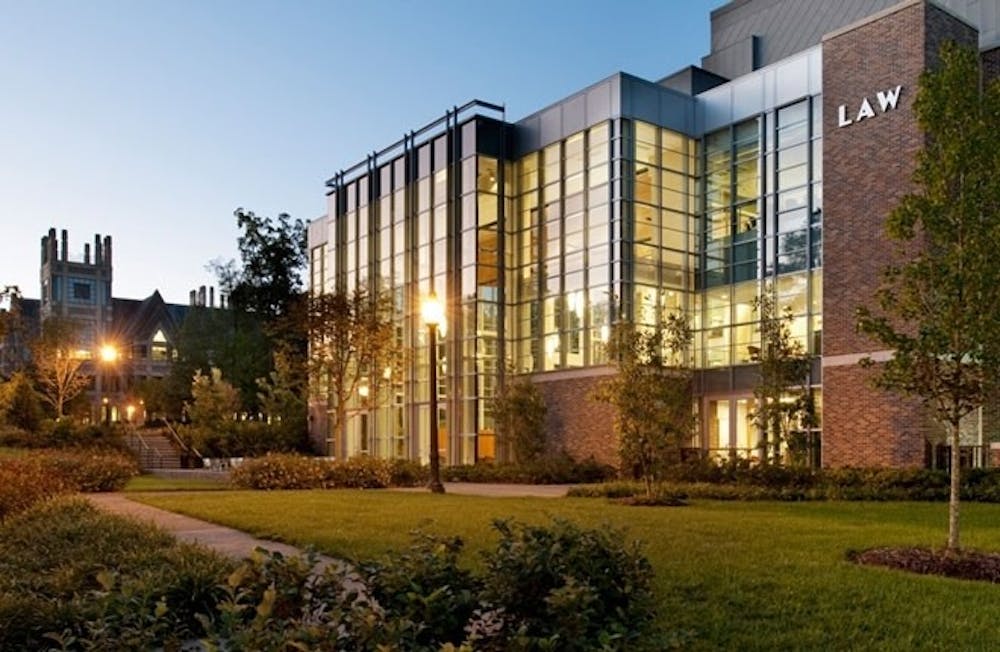Duke Law School recently announced its first certificate for Juris Doctor students.
The new program—the Public Interest and Public Service Law Certificate—is specifically designed for students who have an interest in public service.
Stella Boswell, assistant dean of public interest and career development, said public service jobs have become more competitive in recent years. As a result, law students have to clearly demonstrate a strong interest in public work—something they can accomplish with the new certificate.
“What makes you highly qualified in the private sector with private law firms may not be what government and public interest employers are looking for,” Boswell said. “Instead, what they're looking for is really somebody who has a passion for and a commitment to service, so the certificate would be one way you can demonstrate that.”
Boswell added that there is a demand for more public counsel. In North Carolina, legal aid funds have been cut by more than half since 2008, according to the News and Observer.
“Always, throughout time, people have had great legal needs that are not going to be met in the private sector,” Boswell said. “Low and middle income people in this country have always had trouble with getting legal representation for things they need, so public interest lawyers are the people who step in to do that.”
Students in the program must perform at least 75 hours of community service and work full-time in the public sector during a summer while pursuing their degree.
South Moore, second year law student and president of the Government and Public Service Society, praised the law school for making public service more of a priority.
“I think no matter what legal career you go into, public service is going to be a part of it,” Moore said. “Speaking as someone who went to law school specifically to have a public interest career, it's great for me...I think it makes Duke an even more competitive law school than it already is.”
Coming from the University of North Carolina at Chapel Hill, Moore said his undergraduate experience emphasized public service. He feared that wouldn’t be the case at Duke.
“My big concern when I came to Duke—other than that I didn't want to cheer for your basketball team—is that that same sense of service wouldn't be there at the Law School," he said. "I was completely wrong to have worried about that. The certificate program is example of that.”
Brenda Berlin, Trinity ’86, supervising attorney of the Children’s Law Clinic and chair of the certificate’s advisory board, spearheaded the campaign to create the certificate. Berlin and her law school colleagues considered similar programs at peer institutions while designing the certificate, Boswell said.
After it was drawn up, the certificate was presented to the law school faculty for approval. Tia Barnes, assistant dean for academic affairs, said that the certificate had much faculty support.
“There are lots of different practice areas in the field of law and our curriculum is open to students to chart their own path and to develop a curriculum that suits their interests," Barnes said. “But, I think one of the reasons that it had a lot of support is because we wanted to be able to help students who plan to go into public interest or public service more concretely define and demonstrate their interest.”
Though there is a requirement to show demonstrated interest in public service, Barnes noted that the certificate is also open to law students who have an interest in public service but are unsure if they want to do such work after graduation.
“It's not highly competitive to get into the program,” Boswell said. “We want the program to be very open to the students who are interested in pursuing this path.”
Get The Chronicle straight to your inbox
Sign up for our weekly newsletter. Cancel at any time.
Class of 2019
Editor-in-chief 2017-18,
Local and national news department head 2016-17
Born in Hyderabad, India, Likhitha Butchireddygari moved to Baltimore at a young age. She is pursuing a Program II major entitled "Digital Democracy and Data" about the future of the American democracy.

